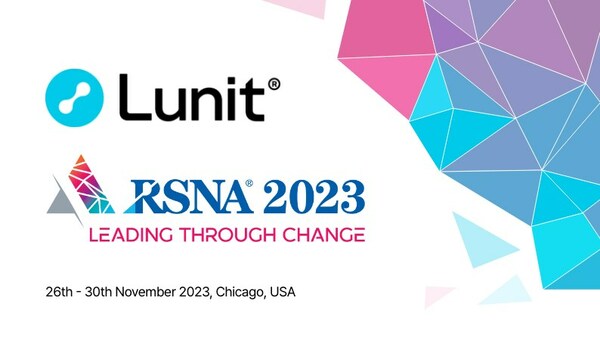New Study Backs that Lunit's AI Model Transforms Chest Radiograph Reporting, Enhancing Screening Efficiency and Safety - to be presented at RSNA 2023
20 Nov 2023
-
Eight new research findings and expert insights in eight in-booth sessions with global leaders to amplify the impact of Lunit's AI solutions at RSNA 2023
SEOUL, South Korea, Nov. 20, 2023 /PRNewswire/ -- Lunit (KRX:328130.KQ), a leading provider of AI-powered solutions for cancer diagnostics and therapeutics, is set to unveil eight groundbreaking abstracts at the Radiological Society of North America (RSNA) 2023 Annual Meeting in Chicago from November 26 to November 30. Three will be presented orally, and the remaining five will be featured as ePosters.
Continue Reading

Preview
Source: PRNewswire
Lunit to participate in RSNA 2023 Annual Meeting
In an oral presentation, Lunit explores the effectiveness of a newly developed normal filtering (NF) AI model in autonomously reporting normal chest radiographs. The research evaluates AI's sensitivity in detecting abnormalities, the proportion of chest radiographs eligible for removal from reporting, and the combined impact of Lunit INSIGHT CXR, a commercially available (CA) AI detecting predefined findings. The NF model demonstrated a 97.8% average sensitivity when applying a 50% specificity threshold, resulting in a total 22% reduction in chest radiographs requiring reporting. Additionally, the CA model detected an extra 16.7% of missed clinically meaningful abnormalities, positioning it as a valuable safety net. The study demonstrates that normal filtering AI has the potential to alleviate the workload of radiologists, and Lunit INSIGHT CXR acts as a vital safeguarding mechanism to prevent the overlooking of potential abnormalities. Lunit plans to elevate its commitment to innovative AI solutions in radiology by officially launching the NF model in the near future.
Lunit also investigates mammographic parenchymal patterns and longitudinal changes to develop an AI model predicting future breast cancer risk. The AI model, developed using serial 16,113 full-field digital mammograms from over 9,000 women, demonstrated improved risk prediction with AUCs of 0.75 at 1-year, 0.76 at 2-year, and 0.73 at 3-year outcomes. This study showcases the feasibility of an AI predictive model for identifying mammographic parenchymal features, enhancing risk stratification with longitudinal changes, and accelerating personalized breast cancer screening.
Additionally, a Swedish research team led by Dr. Karin Dembrower, Senior Physician of Capio S:t Göran Hospital Mammography Clinic, presents insights from the ScreenTrustCAD trial's sub-study. ScreenTrustCAD is the world's first prospective study of AI in large population-based breast cancer screening, published in the Lancet Digital Health. The trial revealed that in a double-reading setting, Lunit INSIGHT MMG plus one reader achieved superior cancer detection to two human readers, without increasing recalls.
This sub-study analyzed differences in consensus recall decisions depending on whether Lunit INSIGHT MMG or radiologists had initially flagged the exam as abnormal. In total, 5,515 exams were flagged for consensus discussion, with AI, reader 1, and reader 2. Among 2,501 consensus cases not flagged by AI but by one or two radiologists, 25% were recalled, and 0.8% had cancer detected, resulting in a 3.4% positive predictive value (PPV). For 3,014 consensus cases flagged by AI (and zero to two radiologists), 24% were recalled, and 7.2% had cancer detected, resulting in a 29% PPV.
Notably, for the exams that the radiologists in the consensus discussion decided to recall, the PPV for exams previously flagged by AI, compared to those only flagged by radiologists, was nearly 10 times higher. The study concludes that radiologists involved in the consensus discussions should be made aware of their bias, and the consensus discussion may need to be redesigned for optimal use of AI reads.
"Our studies show how AI can enhance radiology, from reducing radiologists' workload to predicting breast cancer risk. I firmly believe that these studies mark significant contributions to the new era of radiology with personalized cancer care," said Brandon Suh, CEO of Lunit. "Join us at our booth to delve deeper into our work and gain valuable insights from our in-booth sessions with globally renowned speakers we invited."
Explore these studies at Lunit's RSNA 2023 AI Showcase booth (#4165) and attend eight in-booth sessions featuring esteemed speakers like Dr. Karin Dembrower, and Dr. David Gruen, Radiologist at Jefferson Radiology and former Chief Medical Officer at IBM Watson Health. Witness firsthand how Lunit is shaping the future of radiology with the Lunit INSIGHT suite deployed in over 3,000 medical institutions worldwide.
###
Some of the key abstracts by Lunit at RNSA 2023 include:
About Lunit
Lunit is a deep learning-based medical AI company on a mission to conquer cancer. Our focus is on developing AI solutions for precision diagnostics and therapeutics, ensuring the right diagnosis, and treatment, at the right cost for each patient. Lunit is devoted to developing advanced medical image analytics and AI-based biomarkers via cutting-edge technology.
Founded in 2013, Lunit has been acknowledged around the world for its advanced, state-of-the-art technology and its application in medical images. As a medical AI company grounded on clinical evidence, the company's findings are presented in major peer-reviewed journals, such as the Journal of Clinical Oncology and the Lancet Digital Health, and global conferences, including ASCO and RSNA.
After receiving FDA clearance and the CE Mark, our flagship Lunit INSIGHT suite is clinically used in approximately 3,000+ hospitals and medical institutions across 40+ countries. Lunit is headquartered in Seoul, South Korea, with offices and representatives worldwide. For more information, please visit lunit.io.
SOURCE Lunit
For more details,please visit the original website
The content of the article does not represent any opinions of Synapse and its affiliated companies. If there is any copyright infringement or error, please contact us, and we will deal with it within 24 hours.
Organizations
Indications
Targets
-Drugs
-Hot reports
Get started for free today!
Accelerate Strategic R&D decision making with Synapse, PatSnap’s AI-powered Connected Innovation Intelligence Platform Built for Life Sciences Professionals.
Start your data trial now!
Synapse data is also accessible to external entities via APIs or data packages. Leverages most recent intelligence information, enabling fullest potential.





